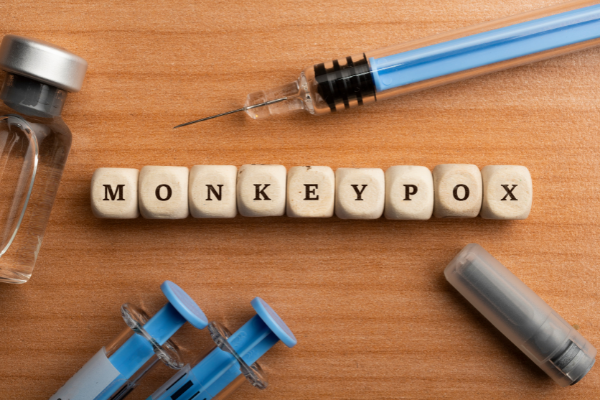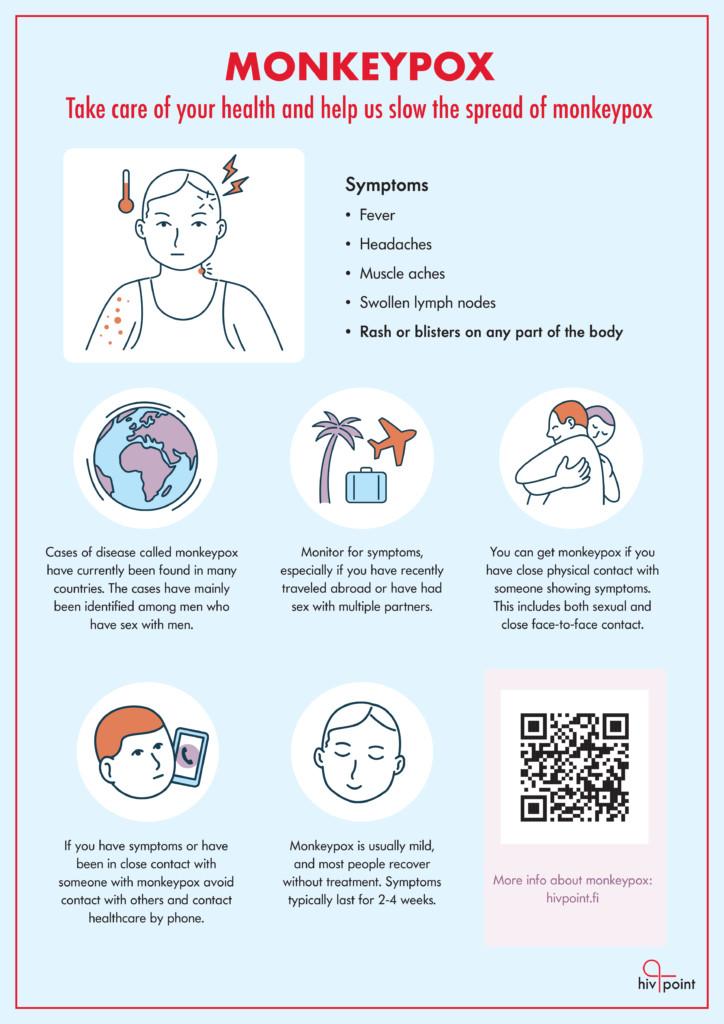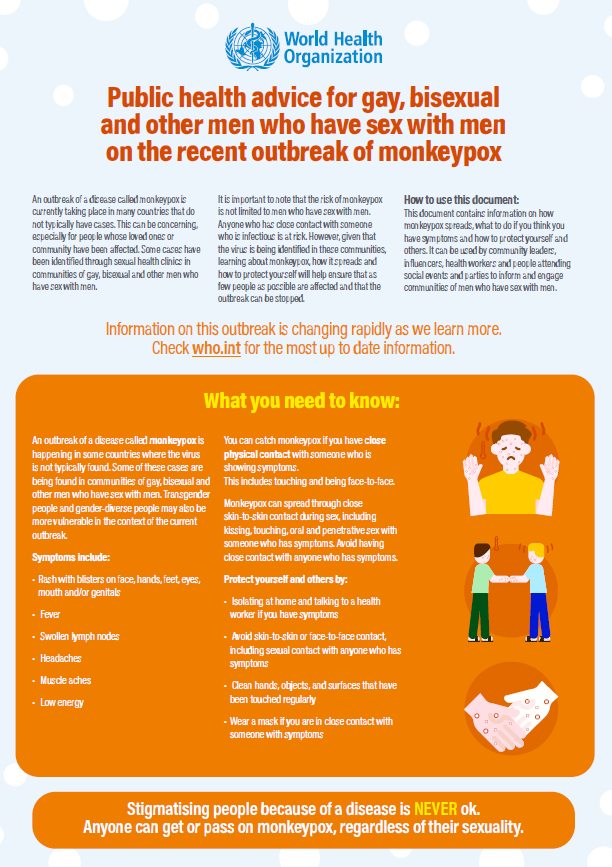Mpox (monkeypox)

Page last reviewed 20.3.2024
An outbreak of a disease called mpox is currently taking place in many countries that do not typically have cases. Infections have been linked to sex between men and have occurred especially in people who have many sexual partners. However, mpox is not a new disease. Human monkeypox was first identified in 1970, commonly found in Central and West Africa.
Several mpox cases have been identified through Europe since spring 2022 in communities of gay, bisexual and other men who have sex with men. According to European Centre for Disease Prevention and Control (ECDC) by the 27th of September more than 23,000 mpox infections have been diagnosed in Europe. Spain, Germany and the UK have had the highest number of cases.
The number of infections has been on a strong decline during 2023. By the summer of 2023, only few infections have been found in Europe. According to infection statistics, a slight increase in infections can be seen at the end of summer. Especially in Portugal, the number of infections has increased during July and August, when 40 infections have been found in 4 weeks. In other European countries, there have been hardly any or only few infections. There is hardly any or only few infections at the moment in Europe (situation spring 2024)
Read here one persons experiences on getting monkeypox infection.
Mpox cases in Finland
According to the Finnish institute of health and welfare a total of 42 cases have been confirmed by end of 2022. All infections have been found in men. There is no new mpox cases since 2022 in Finland. (Situation spring 2024
The Hospital District of Helsinki and Uusimaa HUS has informed that in July in Finland, few monkeypox infections have also been reported in people who have caught the infection in Finland.
What kind of symptoms does monkeypox have?
Symptoms of monkeypox typically include a fever, intense headache, muscle aches, back pain, low energy, swollen lymph nodes and a skin rash or lesions. Skin changes may appear on the face, hands, feet, mouth and / or in the genital or anus area (especially in cases where the infection was transmitted through sex).
The symptoms of monkeypox can be very diverse, and it can easily be confused with STIs. Monkeypox can have very mild symptoms. You should pay attention to skin changes, especially if you have recently had new sexual partners.
How long will the symptoms last?
The typical incubation period is 6–13 days, but it can be up to 21 days. Symptoms typically last between 2 to 4 weeks and go away on their own without a treatment.
How is monkeypox transmitted?
Monkeypox does not spread from one person to another very easily. It requires close physical contact. Monkeypox can spread through close skin-to-skin contact during sex, including kissing, touching, oral and penetrative sex with someone who has symptoms.
The infection can be contracted through direct close contact with the skin changes of a sick person, for example through sexual contact as well as through droplets in a close face-to-face contact. Read the definition of close contacts by Finnish institute of health and welfare.
Condom protects against sexually transmitted infections, but against monkeypox it does not provide adequate protection. At the moment, there is not enough information about the protection that a condom provides against monkeypox. Clothing, bedding and towels that have been contaminated with the virus can also infect others.
How is monkeypox diagnosed?
There is a test for monkeypox. Monkeypox infection can be detected in laboratory tests of samples taken from skin changes using the gene amplification (PCR) method. In Finland, samples can be taken in any health care district.
Who can get infected with monkeypox?
It is important to note that the risk of monkeypox is not limited to men who have sex with men. Anyone who has close contact with someone who is infectious is at risk. Having multiple sexual partners is known to increase the risk of getting infected. However, given that the virus is being identified in these communities, learning about monkeypox will help ensure that as few people as possible are affected and that the outbreak can be stopped.
How can monkeypox infection be prevented?
In the prevention of monkeypox, it is important to get information about the ways of infection and symptoms of monkeypox, so that you can get tested if necessary and avoid contact if you have been infected.
Several sporadic sexual contacts have been found to increase the risk of being infected with monkeypox. Monkeypox is known to be transmitted in places and events where sex is practiced. If you want to reduce the risk of monkeypox, you can consider reducing your sexual partners and evaluate going to places and events where you have sex.
It is good to know that the monkeypox situation in Finland is good at the moment, but in many European countries, such as Spain, there are significantly more monkeypox cases. This should be taken into account when travelling and returning from a trip. It is important to monitor your own and your partner’s symptoms and get tested if necessary.
There is a vaccine for monkeypox that protects against infection. Those who belong to the risk groups for monkeypox are recommended to take the vaccine. The vaccine has been available in Finland since October 2022 for risk groups. Read more about vaccine HERE
A condom effectively protects against HIV and sexually transmitted infections, but against monkeypox it does not provide adequate protection. Good hand hygiene and coughing hygiene reduce the risk of infection.
What should you do if you think you may have monkeypox?
If you identify a new rash anywhere on your body, seek medical advice by calling your healthcare provider. If you live in Helsinki University Hopital area (HUS), you can contact the Venereal diseases outpatient clinic. If monkeypox is transmitted during sex, the rash may first appear around the genitals or the anus. Avoid having close contact with anyone until the rash is completely gone.
- If possible, self-isolate and avoid close contact with others, unless advised otherwise by your healthcare provider.
- Ask your close contacts and sexual partners if they have had similar symptoms.
- If you notice a new rash on your partner’s body, including around the genitals and anus, talk with them and advise that they visit an STI clinic or consult a healthcare provider.
What should you do if you test postive for monkeypox?
If your healthcare provider confirms you have monkeypox, follow their advice. Depending on the national recommendations, advice may include the following:
- Self-isolate if you can, and in particular you should avoid contact with pregnant women, young children, or immunocompromised individuals. You are contagious until the last scab has fallen off.
- Take a break from sex.
- Communicate the list of events you have attended in the last 21 days to the health authorities so they can alert other community members who may have been infected.
- Share the details of close and sexual contacts with health authorities or get in touch with them directly so they can be informed and can protect themselves and others.
- Because of current uncertainties about the ways of transmission, as a precaution wear a condom for 12 weeks even after you have fully recovered.
How is monkeypox being treated?
Monkeypox usually heals on its own and the treatment is used according to the symptoms. If necessary, pain and inflammation caused by blisters can be treated with various analgesics or anesthetic ointments and gels.
Monkeypox can also be treated with a drug called Tecovirimat (TPOXX). However, the medicine is not available in Finland and its availability is currently poor even globally.
Monkeypox vaccinations in Finland
At the end of August 2022, approximately 1400 vaccines used for the prevention of monkeypox arrived in Finland through a joint procurement by the EU.
The vaccine is called Jynneos, and it’s used to prevent monkeypox in both the US and the EU. The vaccine provides protection against diseases caused by orthopox viruses, such as smallpox and monkeypox.
Monkeypox vaccinations are offered to people at high risk of being infected with monkeypox and for those who are exposed to monkeypox. Read more about vaccinations here.

WHO’s public health advice about Monkeypox

